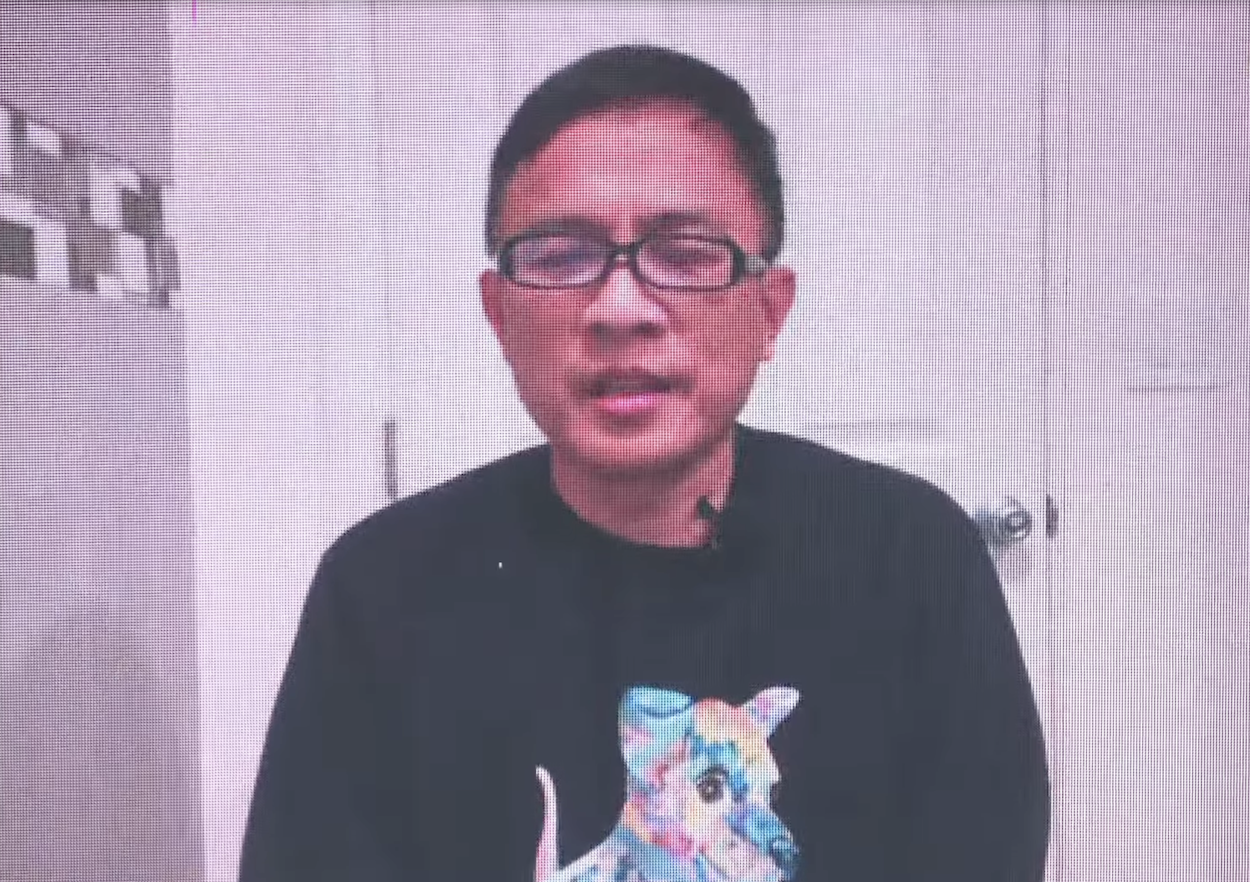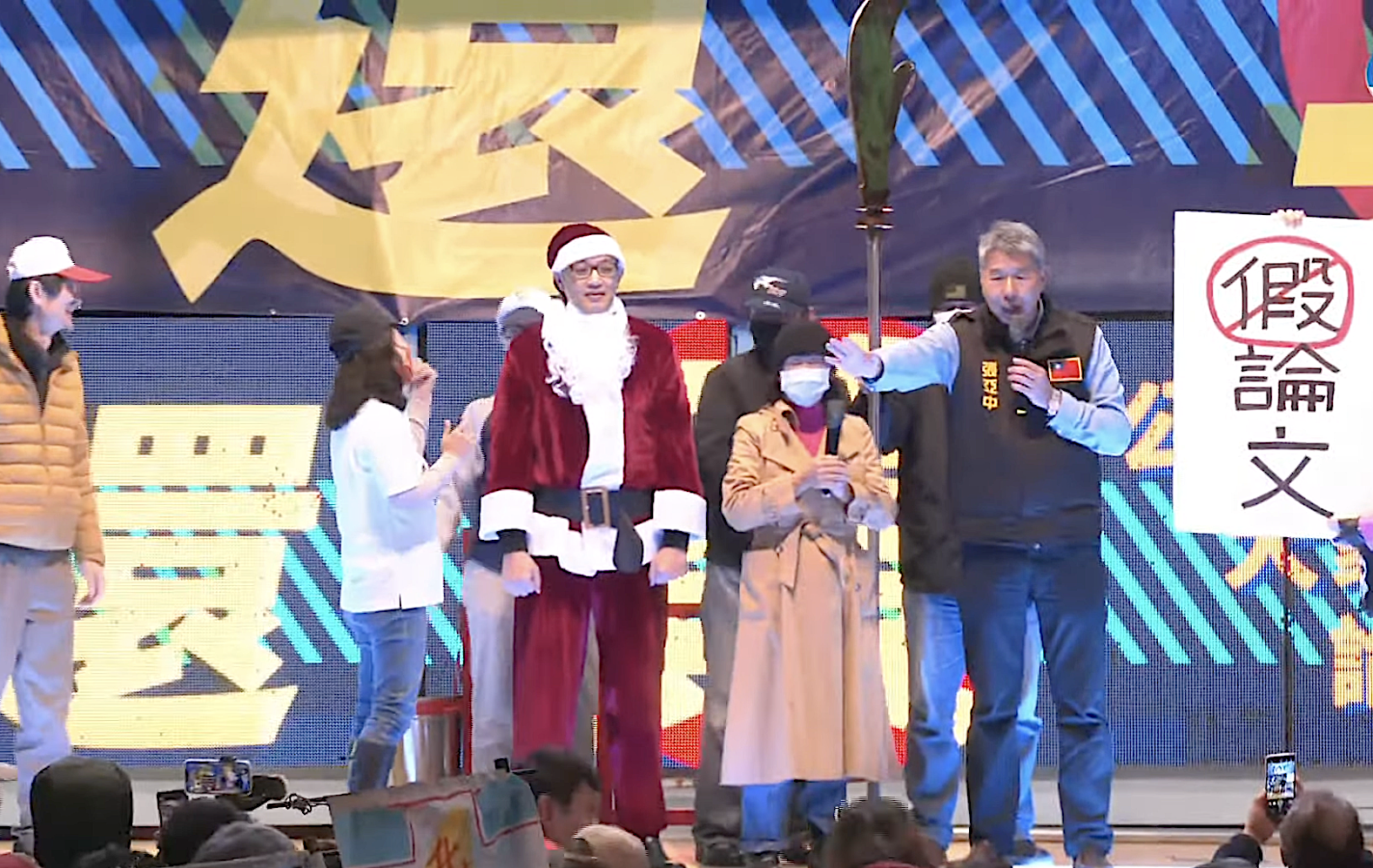by Brian Hioe
語言:
English
Photo Credit: Screenshot
CHANG YA-CHUNG and Dennis Peng came together to organize a rally questioning the validity of Tsai Ing-wen’s dissertation outside of the Presidential Office on Saturday.
The claim that Tsai Ing-wen never obtained a Ph. D and did not turn in a dissertation is a conspiracy theory that began to circulate in Taiwan prior to 2020 presidential elections. Some have termed the conspiracy theory to be the equivalent of birtherism in Taiwan, something politically salient when every democratically elected president in Taiwanese history has held a Ph. D. The conspiracy theory continues despite the LSE stating that Tsai received her Ph. D. The theory seems to begun among the pan-Green camp then spread to the pan-Blue camp.
Livestream of the event
In particular, the fact that the rally was co-organized by Chang and Peng should raise eyebrows. Chang Ya-chung is the head of the Sun Yat-Sen School, a deep Blue educational institution. While he lost to Eric Chu in his recent bid for KMT chair, Chang was the preferred candidate of the deep Blue hardliners in the party. Although Chang was previously an aide to former KMT chair Hung Hsiu-chu, another deep Blue hardliner, Chang turned on her in the process of his chair bid when she questioned his claim to be able to facilitate a five million USD loan to the KMT through a Malaysian friend. Chang previously claimed to be able to facilitate a donation of five million BioNTech vaccines and five million Sinopharm vaccines to Taiwan through a little-known Beijing-based organization.
By contrast, Dennis Peng is a former talk show host on Formosa Television, a deep Green television outlet. Peng platformed claims that Tsai’s dissertation was fake on his show, something that resulted in Tsai filing a libel suit against him. As a result, Peng fled to California, refuses to return to face trial, and is currently facing deportation charges, though Peng has been allowed to attend some court sessions by video conferencing.
Peng also attended the rally by video conferencing. Peng previously appeared on the KMT chair debate hosted by CtiTV in the lead-up to the KMT chair elections, another sign of his increasing closeness to the pan-Blue camp.
The rally was attended not by more than a thousand and very likely had several hundred participants, who gathered outside of a color stage on Ketagalan Boulevard in front of the Presidential Office.
 Dennis Peng speaking at the event through video. Photo credit: Screenshot
Dennis Peng speaking at the event through video. Photo credit: Screenshot
Rather memorably, Chang announced the launch of a Tsai Ing-wen Ph. D dissertation NFT to coincide with the rally, which retails for around 1,000 NT on OpenSea. Those that purchase the NFT will also receive a copy of a book by Chang explicating the thought of Sun Yat-Sen. The rally also included Santa Claus making an appearance on stage. At one point around halfway through the rally, Chang and other rally participants held up a metallic halberd, which remained on-stage for the rest of the event.
Though the rally featured a primarily pan-Blue composition, that the rally was co-organized by Chang and Peng–respectively figures of the pan-Blue and pan-Green camps–is notable. Namely, what this points to is the convergence of the deep Blue and deep Green ends of the political spectrum over the issue of Tsai’s Ph. D dissertation.
In part, the deep Blue camp begrudges Tsai because they see her as fomenting “cultural Taiwanese independence”; even as she has chosen to adhere to the ROC, they assert that the “ROC (Taiwan)” that Tsai speaks off is not the same as the ROC that they believe in. The deep Blue camp has also increasingly drifted towards calls for immediate unification between Taiwan and China. By contrast, the deep Green camp begrudges Tsai because they do not see her as doing enough to push for Taiwanese independence in a manner that realizes de jure Taiwanese independence in the near future.
Yet it has been suggested that one of the fundamental motivations for the deep Green and deep Blue animus against Tsai is because she is a woman, and they cannot accept that a woman could obtain a Ph. D–much less become president of Taiwan. Misogyny is, after all, bipartisan. Other shared values between the deep Greens and deep Blues is social conservatism, in that both sides begrudge Tsai for progressive social legislation such as the legalization of gay marriage. The fundamental political split between the pan-Greens and pan-Blues, after all, is not regarding a left/right political divide, but between independence and unification. As such, this does not extend to progressive versus conservative politics.
 Chang Ya-chung holding a halberd on stage at the event, alongside Santa Claus. Photo credit: Screenshot
Chang Ya-chung holding a halberd on stage at the event, alongside Santa Claus. Photo credit: Screenshot
It may be, then, that the deep Greens and deep Blues have become increasingly united on this front–united by their opposition to Tsai’s progressive domestic politics and moderate stance on the issue of independence versus unification. Tsai has instead chosen to adhere to the status quo, to avoid unnecessarily provoking China into armed retaliation, and to avoid losing US support.
Indeed, one notes that when the deep Green Formosa Alliance–a key figure of which was Formosa Television head Kuo Pei-hung–announced that it would be formally organizing into a political party in July 2019 to challenge Tsai on her reelection, its central committee unusually included Hung Hsiu-chu’s former running mate Ou Chong-jing. Ou also supported former Kaohsiung mayor Han Kuo-yu in his meteoric rise to power, with Han becoming the KMT’s 2020 presidential candidate.
The drift of the deep Greens into an alliance with the deep Blues–or even capture of the deep Greens by the deep Blues–may not be a new phenomenon, in this sense. Rather, it may have been an ongoing phenomenon for some years that did not occur overnight.

